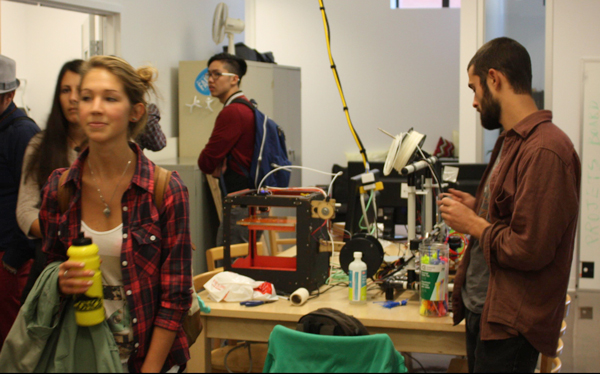
By Sylvia Moffatt
Community Engagement Day (CED), organized by the Social Equity and Diversity Education Office (SEDE), took place Oct. 2 and brought together a multitude of community-based groups and organizations on and around McGill Campus. The initiative was started in order to encourage students, staff and faculty involvement in volunteerism, as well as to promote and reinforce community engagement.
This year, some 550 participants took part in CED. The projects spanned from workshops such as SEDE’s spaghetti nights where volunteers made spaghetti for cooking activities in a daycare center, to the University of the Streets Café Project where predominant issues such as gentrification in Montreal’s southwest borough were discussed in the intimate setting of Café Bloom. CED offers an array of opportunities for the McGill community to step out of its so-called ‘bubble’ and to get involved in the broader community.
For the second year, the Quartier de l’innovation (QI) took part in CED. Consisting of Griffintown, Little Burgundy, Saint-Henri and Point Saint-Charles, the QI is home to a myriad of creative spaces. This includes 2 incubators: the Centre d’Entreprises et d’Innovation de Montréal (CEIM) which offers services and management support to companies in information technology, new media, industry and even life sciences, and the Centre de l’Entrepreneurship Technologique (Centech) which facilitates the development of start-up technology.
Other initiatives such as BioFuelNet Canada – the second QI-led initiative to be established in the area after McGill HPC – draws on the expertise of 74 researchers and 25 postsecondary institutions, creating one of the most extensive research networks on the advancement of biofuels in Canada.
Échofab, also the first fab lab in Canada accredited by the MIT, is a laboratory that provides professional training and expertise in experimental digital fabrication and offers workshops in electronic, robotic and 3-D impression development.
This year, as part of Community Engagement Day, a group of students and staff participated in a walking tour of the QI district, in an effort to make the QI more accessible to the McGill community.
Julien Ouellet, External Affairs Officer for the Post-Graduate Students’ Society at McGill, who attended the QI tour, was “encouraged by the large number of facilities and opportunities provided by the QI to students,” however he noted that too few post-graduates knew about the resources available within the district and he wants to spread the word.
During the QI tour this year, students and staff were shown around St. Joseph’s Church in Little Burgundy. The church is soon to be converted into the Salon 1861, and will see the establishment of QI’s Laboratory of Urban Culture. The laboratory is intended to be a space where discussions can be held on the future of the neighbourhood – as was envisioned by the Will Straw, Director of the McGill Institute for the Study of Canada. Salon 1861 will salvage an important heritage building, as well as create spaces to host a full range of collaborative research projects, exhibitions, events, artist workshops and community organizations.
As well, a group of McGill students helped renovate and paint the roof of the Darling Foundry, a visual arts centre in the QI, as part of CED.
The QI’s involvement in CED is yet another example of McGill’s commitment in bridging the gap between the University and the broader community. Isabelle Péan, Project Director, QI at McGill University, said, “collaborating with SEDE for Community Engagement Day brings a lot of value to the QI. It allows us to connect community partners with students, staff and faculty and to expand volunteerism in the southwest district.
“It’s a win-win in terms of community impact and collaboration.” The combined efforts of SEDE and the QI are expected to lead to an even greater increase in McGill student, staff and faculty involvement in subsequent years, which will ultimately benefit the Montreal community.
Click to learn more about CED and the QI.
